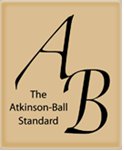Real Standards for Hypnotherapy
 Choosing an effective Hypnotherapist can be a daunting task. Currently, there is an attempt to provide National Standards for Hypnotherapy. Unfortunately, because this needs to include every hypnotherapist in the country, the standards are low.
Choosing an effective Hypnotherapist can be a daunting task. Currently, there is an attempt to provide National Standards for Hypnotherapy. Unfortunately, because this needs to include every hypnotherapist in the country, the standards are low.
In order to address this and to help the public make an informed choice when electing to go for hypnotherapy, we have created the Atkinson-Ball Standard. By knowing what to look for, you can avoid the pitfalls and link up with a fully-qualified Advanced Hypnotherapist who can really help.
When it comes to choosing a therapist, most people have three big concerns:
- Is Hypnotherapy right for me?
- Will this hypnotherapist be able to help me?
- What should I look for?
In the current climate of enthusiasm for drug-free, holistic therapies which complement conventional medicine, Advanced Hypnotherapy techniques are being used successfully to treat a wide range of psychological, emotional and physical problems.
Advanced Hypnotherapy is far more effective than many of the ‘talking’ therapies for one very simple reason. Talking about your problem may help in the short term, but to get to the cause of the problem, you need to get to the subconscious mind.
This is why, in the world of hypnotherapy, ‘highly qualified’ does not necessarily mean ‘highly effective’. That is not to say you should ignore professional qualifications, but what you need is effectiveness. No one’s psychological problem is intellectual in nature; it is emotional – it sits in the subconscious mind. You need a therapist who is skilled in using tools which enable you to get to the cause of the problem and fix it, without dragging up or re-living your past.
It’s a bit like having your portrait painted. Would you choose an artist with a PhD in Art, who may know all there is to know about art, or would you choose an accomplished artist who can actually paint the picture?
One problem is: all hypnotherapists are NOT the same. There are many schools of hypnotherapy, many teaching Ericksonian style hypnotherapy. Often, this results in practitioners engaging in suggestion therapy – wordy sessions that either seem to ramble, or are based on scripts which are read to the client.
Our hypnotherapists are trained in Elman-based hypnotherapy, employing effective tools, specifically for the client, based upon what the client needs at any given point in the process.
All hypnotherapists meeting the Atkinson-Ball Standard:
- Have successfully completed Advanced Hypnotherapy training at The Atkinson-Ball College
- Are members in good standing of The Corporation of Advanced Hypnotherapy
- Are fully insured
- Are committed to Continuing Professional Development
You can find our Register of Advanced Hypnotherapists at: www.advanced-hypnotherapy-register.com
Next, speak with them on the telephone.
- Are they friendly?
- Are they interested in helping you?
- Do they understand the nature of your problem?
Then, arrange to meet with them for an Initial Consultation (usually up to 30mins), without any obligation. You should not be booking any sessions at this point. When you meet:
- Do they have a professional appearance?
- Do they have a professional manner?
- What is their environment like?
- Do you feel comfortable with them?
- Are they understanding and friendly?
- Do they appear competent?
- Are they able to answer your questions and clear up any misunderstandings?
- Do they explain what hypnosis is like?
- Do they give you an idea of how many sessions might be required?
During the First Session, your therapist should:
- Address any concerns you might have
- Make you aware of what they will be asking you to do
- Obtain your agreement
- Guide you into hypnosis
- Give you some suggestions in order to start the therapeutic process
- Record the process with you, so that you can carry on the work between sessions
- Make sure that you are alert before ending the session
On the second and subsequent sessions (in most cases, Advanced Hypnotherapists take between 3 and 6 sessions to complete the work):
- Obtain detailed feedback of how the work is progressing
- Address any concerns you may have
- Make you aware of what they will be asking you to do
- Obtain your agreement
- Help you into hypnosis more quickly
- Show you how to achieve better quality hypnosis
- They may access your subconscious mind directly, or employ a therapeutic technique determined by your specific needs
- They will make sure the work is carried out in ‘safety and comfort’
- They will make sure the work is complete before ending the session
- Make a recording reinforcing the work done during the session
On the final session:
- Obtain detailed feedback of how the work is progressing
- Address any concerns you may have
- Make you aware of what they will be asking you to do
- Obtain your agreement
- Check that the work is complete
- They may teach you self-hypnosis and record this process
If you find that your experience appreciably differs from the above, please address this to your therapist; there is usually a very good reason. If, however, you are not satisfied, please contact me directly. E-mail is the best option for this (cahsbi@gmail.com), but I can be reached at the following number: 0800 289 5198
My name is Greg Forde
President, The Corporation of Advanced Hypnotherapy
